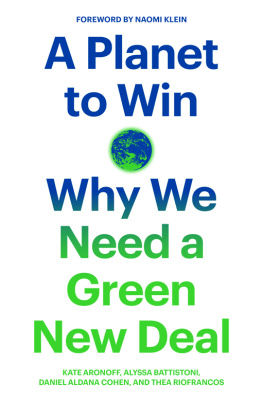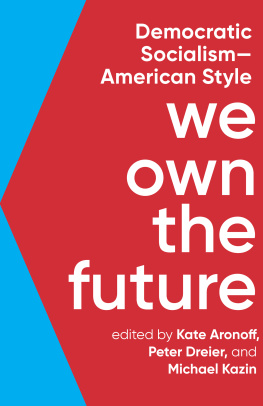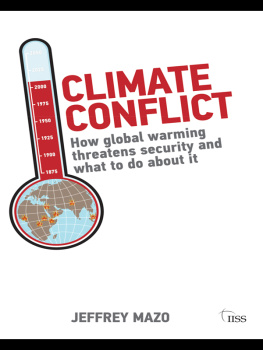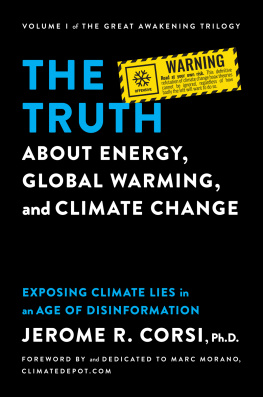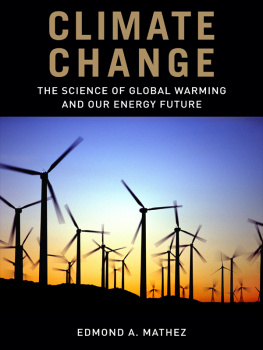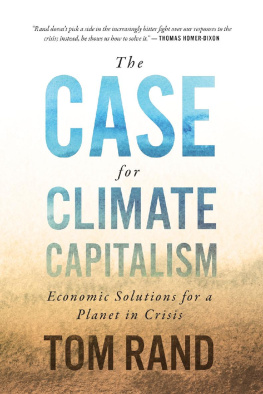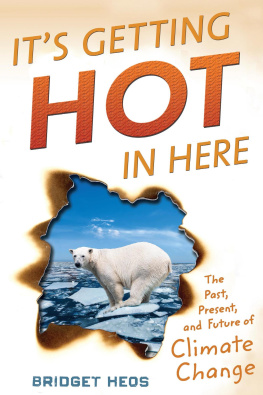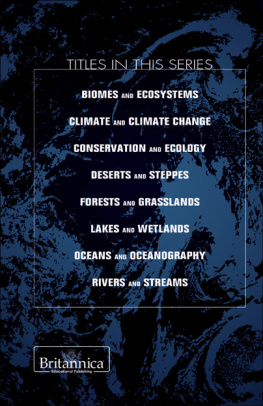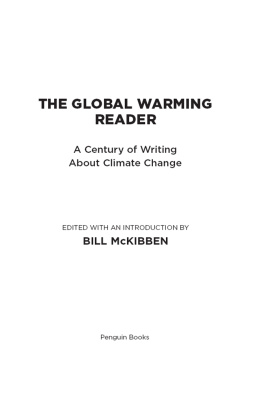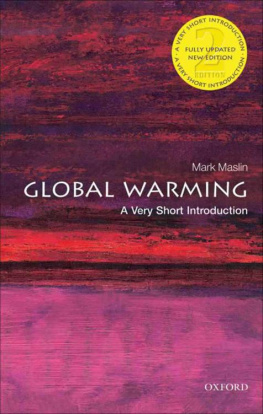A compelling indictment of capitalism. Well documented and necessarily provocative.
K IRKUS , starred review
Kate Aronoff is so sharp, witty, and relentlessly on target that reading her fills me with hope. Overheated is a blistering account of the many varieties of denial that have prepared the ground for climate catastropheand a thrilling tour of the kind of visionary politics and policies that could put the future back in our hands. Please: read this book.
N AOMI K LEIN , author of This Changes Everything: Capitalism vs. the Climate
As this masterful volume makes clear, Kate Aronoff is one of the most important writers ever to take on the climate crisis. Shes hard-headed in her assessment of how neoliberalism put us on the brink of civilizational collapse, but shes not hard-hearted: she offers a persuasive case for how, with lots of solidarity, we could still escape the worst of this mess. This book is careful, comprehensive, and compelling, and it should be widely read, since it offers a baseline understanding for thinking through the greatest challenge humans have ever faced.
B ILL M C K IBBEN , author of Falter: Has the Human Game Begun to Play Itself Out?
In this deep and vital analysis, Kate Aronoff subjects every flimsy pretext and prevarication for postponing the climate emergency to a forensic analysis. She uncovers the genealogy of ideas, and the flows of money behind them. And then, with a razor-sharp intellect, she eviscerates the climate deniers, one lie at a time. If we are to win the battle for a livable planet, well only do so with the moral clarity and intelligence that Overheated has in abundance.
R AJ P ATEL , author of Stuffed and Starved: The Hidden Battle for the World Food System
The Bible observes that the heart is deceitful, who can understand it? The greed at the heart of climate denialism isnt new, but understanding how it has warped our imagination for what is possible is critical work for our time. Im grateful to sister Kate Aronoff for doing this work and for making plain exactly what sort of bold action is needed if we are not only to preserve a livable planet but also revive the heart of our democracy.
W ILLIAM J. B ARBER II, cochair of the Poor Peoples Campaign and author of We Are Called to Be a Movement
Climate-driven apartheid that sacrifices the many for the few, or reformed democracy that will work for the vast majority? That is the choice, explains Kate Aronoff in this bracing call to save ourselves by saving our planet from fossil fuel corporations and their enablers.
N ANCY M AC L EAN , author of Democracy in Chains: The Deep History of the Radical Rights Stealth Plan for America
Copyright 2021 by Kate Aronoff
Cover design by Pete Garceau
Cover images iStock/Getty Images
Cover copyright 2021 Hachette Book Group, Inc.
Hachette Book Group supports the right to free expression and the value of copyright. The purpose of copyright is to encourage writers and artists to produce the creative works that enrich our culture.
The scanning, uploading, and distribution of this book without permission is a theft of the authors intellectual property. If you would like permission to use material from the book (other than for review purposes), please contact permissions@hbgusa.com. Thank you for your support of the authors rights.
Bold Type Books
116 East 16th Street, 8th Floor, New York, NY 10003
www.boldtypebooks.org
@BoldTypeBooks
First Edition: April 2021
Published by Bold Type Books, an imprint of Perseus Books, LLC, a subsidiary of Hachette Book Group, Inc. Bold Type Books is a co-publishing venture of the Type Media Center and Perseus Books.
The Hachette Speakers Bureau provides a wide range of authors for speaking events. To find out more, go to www.hachettespeakersbureau.com or call (866) 376-6591.
The publisher is not responsible for websites (or their content) that are not owned by the publisher.
Library of Congress Cataloging-in-Publication Data
Names: Aronoff, Kate, author.
Title: Overheated : how capitalism broke the planetand how we fight back / Kate Aronoff.
Description: First edition. | New York : Bold Type Books, 2021. | Includes bibliographical references and index.
Identifiers: LCCN 2020049065 | ISBN 9781568589473 (hardcover) | ISBN 9781568589961 (ebook)
Subjects: LCSH: Environmental policyEconomic aspectsUnited States. | CapitalismEnvironmental aspectsUnited States. | Climatic changesGovernment policyUnited States. | Climate change mitigationUnited States. | Energy industriesEnvironmental aspectsUnited States. | Energy policyEconomic aspectsUnited States. | Business and politicsUnited States.
Classification: LCC HC110.E5 A785 2021 | DDC 363.738/745610973dc23
LC record available at https://lccn.loc.gov/2020049065 ISBNs: 978-1-56858-947-3 (hardcover), 978-1-6528-0046-8 (international), 978-1-56858-996-1 (ebook)
E3-20210325-JV-NF-ORI
For Trent, Gavin, and Madison
T HE EARTH IS an unforgiving scorekeeper and an ethically neutral one. The stratigraphic record has silently catalogued key moments in history, taking careful note as we leave behind little sediment markings on layers of rock. At some point, humans ceased to be only one of the billions of species participating in this planets dynamic systems and became its defining featurea geological epoch that since the early 2000s has been known informally as the Anthropocene.
When exactly we became the stars of the show is still the subject of some debate. In 2017, a cross-disciplinary group of scientists in the Anthropocene Working Group (AWG) reached the preliminary conclusion that plutonium fallout from Cold Warera nuclear arms tests marked the start of the Anthropocene around the year 1950.
Like rock formations or atmospheric concentrations of carbon, the causes of that Great Acceleration took time to accumulate. Rejected theories on the origins of our current epochAnthropocene precursors, as the AWG calls themoffer clues. Some have suggested a start date of 1784, when James Watt refined the design of the steam engine that, powered by coal, would fuel Britain s Industrial Revolution.
The sweeping scientific terms used to describe the climate crisisof epochs and degrees and parts per millionobscure the sheer amount of human suffering that has fueled it. The largest single cause of climate change is particular humans moving about this earth and doing particular things to it and to one another, including pouring prodigious amounts of greenhouse gases into the sky. Some humans deem some lives more valuable than others in the hunt for profit. An imperfect shorthand for these processes is capitalism.
Capitalism hasnt tended to be a popular protagonist in stories about the climate crisis. Often, its said to be a matter of faulty psychobiology: we humans are hopelessly greedy, hardwired not to deal with the earth-shattering consequences of our wasteful ways. We have trained ourselves, whether culturally or evolutionarily, to obsess over the present, journalist Nathaniel Rich wrote in his blockbuster New York Times Magazine story about a failed early round of climate talks. We worry about the medium term and cast the long term out of our minds, as we might spit out a poison. Facing undoubtedly long odds, its tempting to turn inward, too, seeking personal absolution by lowering your carbon footprint: have fewer kids, take fewer flights, and turn off the lights when you leave the room.
Yet, not long after Watt first fine-tuned his steam engine, just ninety corporationsalmost all of them fossil fuel producershave been responsible for two-thirds of all greenhouse gas emissions. Unlike ExxonMobil and other fossil-fuel firms, the average residents of those countries had not funded elaborate disinformation campaigns to spread doubt about whether those emissions were a problem, lobbied governments for their rights to continue extracting, nor spent vast sums painting themselves as the solution to problems they have continued to fuel. Diffusing responsibility for this crisis to the massesor chalking it up to innate human greedis a convenient narrative for Tillerson and his ilk. It also happens not to be true.


